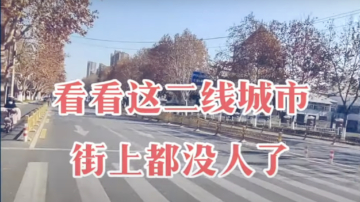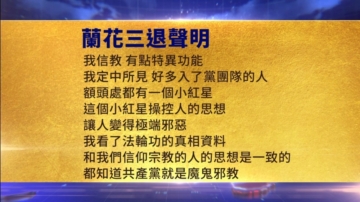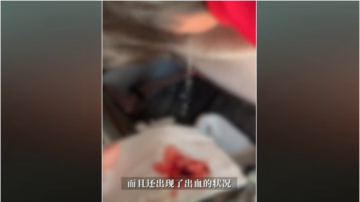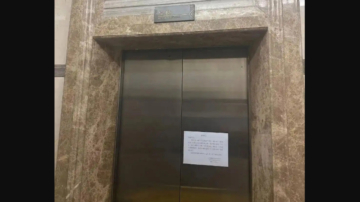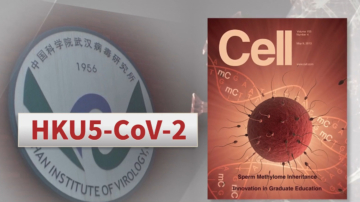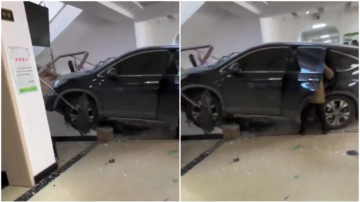【新唐人2013年01月25日訊】最近「房叔」、「房妹」、「房姐」等被媒體炒得火熱,人們對他們深挖後發現,他們很多人是雙戶口甚至是多戶口。這在戶籍枷鎖嚴重桎梏普通民眾的中國,人們吃驚不小。學者指出,多戶口給腐敗行了方便,也有媒體指出,「多戶口畫皮」非扒不可。請看報導。
最近,陝西省神木縣農商行原副行長龔愛愛,因為被爆出擁有超過10億元的房產,名聲「遠揚」。北京《京華時報》證實,除了10億房產,龔愛愛至少擁有四個戶口,兩個在陝西省神木縣公安局人民路派出所,另兩個分別在北京市朝陽區奧運村派出所,及陝西省神木縣大柳塔派出所,名字也不全相同。
依據中國現行戶籍法規,一個公民只能擁有一個戶籍,身份證號也是唯一的、終身不變。山東《齊魯晚報》指出,中國社會的很多行為準則,如婚姻、購房、社保、銀行戶頭、護照,甚至選舉權與被選舉權等,都是建立在這個前提之下。一旦這個前提被蓄意破壞,那麼,法律與倫理都將陷於尷尬的境地, 滋生出難以預料的惡果。因此,多戶口「畫皮」非扒不可。
曾任警察的網友張先生:「只要肯花錢,她可以申請無數個身份證,不同的名字,但是都是她本人的。理論上她就可以擁有無數套房子。所以就方便她把那個贓款、把她的那些不義之財可以轉化,而且你是沒辦法查,因為你查龔愛愛只能查到三套,其他的那些房產你是根本查不到。都是方便這些貪官、方便這些不義之財去洗錢。」
深圳《晶報》認為,在當前的戶籍管理制度下,與戶籍掛鉤的 權利有20多項,尤其在北京、上海等大城市,依附於戶口的福利和便利更多。這些備受關注的「多戶口」事件,本質都是腐敗問題。
深圳當代社會觀察研究所所長劉開明:「你沒有戶口,比如說你在北京買不到車、買不到房。他有不同的戶口,就可以辦不同的身份證,不同的護照。有需要的時候,官員很容易能拿到。比如說,陝西神木這個房姐不是甚麼重要的官員,但是她只要有關係、有錢,她也能拿到多個戶口。」
身為「南京大學」文學博士的劉開明還表示,中國戶口管理是非常嚴格的,但對有特權的人又非常混亂。
「中國人民公安大學」教授王太元指出,戶籍管理經過電腦網路化後,能夠平白無故增添一個戶口,只能是一種情況:這些經辦人、審批人被收買而營私舞弊、貪贓枉法。
曾任警察的網友張先生:「按照規定,你要辦一個新身份證,要改名字,要改戶口本,肯定要局長批。尤其是改名字,成年人改名字,絕對是要局長批的,一般的派出所都沒有權力的。真查下去,那查得官多了,你說他能真查下去嗎?」
張先生曾經是一名警察,他指出,公安部門作假情況非常嚴重,真查下去的話,可能整個公安局人員都得被抓。所以,最多是把那些辦事的民警、臨時工或編外人員抓出來,找幾個替罪羊處理,就完了。
在貪官中,擁有多戶口並非個案。
不久前,被爆料擁有29套房產的鄭州「房妹」,全家都是雙戶口﹔而廣州「最牛煙草局長」陳文鑄、安徽省鳳陽縣公安局原局長陶勇等,也都擁有兩個戶口﹔另外,被稱為「職級最低、數額最大、手段最惡劣的女貪官」,原遼寧省撫順市順城區國土資源局局長羅亞平,有12張身份證、15個戶口本。
對於這些身份多樣的貪官,用「狡兔三窟」來形容都太遜色。
人口研究學者劉忠良發現,對比中共國家統計局2010年發佈的第六次人口普查報告,和第五次普查報告,在1951年至1995年期間出生的中國人,不僅一個沒死,還多出了564萬。
其中,有多少是貪官的雙戶口或多戶口,無法得知!
採訪/朱智善 編輯/宋風 後製/陳建銘
China’s Household Registration System Facilitates Corruption
The terms “House-Uncle” and “House-Sister” have
recently become the new hot topics in China’s media.
These phrases were newly invented by Chinese
netizens, as a way of identifying corrupt officials
of the Chinese Communist Party (CCP) regime.
Reportedly, many officials owned dual or multiple
Hukou (record of official household registration).
Tis has greatly shocked the ordinary Chinese people.
Commentators indicate that multiple home ownership
has facilitated these CCP officials to commit corruption.
Media commented that exposure
of multi-Hukou holders is a must.
Gong Aiai, former Vice President at Rural
Commercial Bank in Shenmu county, Shaanxi
Province, has recently become notorious.
It was disclosed that Gong owns
real estate worth over 1 Billion yuan.
The Beijing Times newspaper confirmed the news,
and added that Gong also holds at least four Hukou.
Three of these Hukou were registered in Shaanxi, and the
other was in Beijing, but all were under different names.
Under existing regulations, each Chinese citizen is
allowed to have only one Hukou, and one ID number.
The Qilu Evening News in Shandong commented that
the Hukou system confines many civil rights in China.
This includes marriage, house buying, social welfare
benefits, opening bank accounts, and application for
passports, as well as the right to elect and to be elected.
The article says that once the regulation is undermined,
it will be legally and ethically embarrassing.
It may even trigger unpredictably bad results.
Therefore, exposing multi-Hukou holders
is a must, according to the media reports.
Mr. Zhang, netizen and ex-police officer): “By buying
off people, one can apply for and get numerous ID cards.
These cards are therefore under different names.
Multi-Hukou facilitates buying many houses, money
laundering, which is also hard to be uncovered.
Probes will find only the three
houses registered under a name.
This is a way that facilitates money
laundering for those corrupt officials.”
Shenzhen-based Jingbao newspaper reviewed that
over 20 civil rights are bound into the Hukou system.
In particular, in large cities, such as Beijing and
Shanghai, where local Hukou entitles a person
to better social welfare benefits and conveniences.
The Jingbao article indicates that corruption
is the root of these multi-Hukou incidents.
Liu Kaiming, director of a civil think tank
in Shenzhen: “Without Hukou, such as in
Beijing, you are ineligible to buy cars and houses.
But with Hukou, one can get many ID cards and passports.
This is very easily done for those officials when they need.
In the case of ‘Shenmu house-sister’, who isn’t
an official, but has money and connections,
she was able to get several Hukou.”
Liu Kaiming adds that the CCP regime
implements a very strict Hukou system.
However, it allows privileged officials to behave unchecked.
Wang Taiyuan, a professor at the Chinese People's
Public Security University, analyzed the issue.
He says that multi-Hukou can be easily created
through the online official Hukou management network.
Therefore, all that needs to be done is buying off the
person in charge, and those involved in the approval.
Mr. Zhang, netizen and ex-police officer: “The regulation
states that a local police chief can approve any new ID
card application, or a name change or Hukou alterations.
Especially for an adult who wants to changes his name, that
will definitely be able to be approved by a local police chief.
The head of the local police station has no authority on this.
If the case is investigated, I believe many police officials
can be pulled up, but can they make a real investigation?”
Mr. Zhang, a former police officer, says that forgery
is very rampant in the public security sector.
If the case is truly investigated, all staff in the public
security bureau who are involved may be arrested.
He speculates that the case would end in the arrest
of those civil police officers who handled the case,
or finding some temporary staff to bear the blame.
Corrupt CCP officials holding multi-Hukou
are very commonplace in China.
Lately, it was disclosed that a former chief of the local Real
Estate Administration in Zhengzhou city owns 29 houses.
Each family member held two Hukou.
Other dual-Hukou holders include Chen Wenzhu,
the former head of the State Tobacco Monopoly
Administration in Shanwei, and Tao Yong,
the former police chief of Fengyang in Anhui.
Another case is Luo Yaping, former chief of Land Resources
Administration of Shuncheng District, in Fushun, Liaoning.
Luo was reported to hold 12 ID cards
and 15 Hukou record booklets.
An old Chinese saying goes that a
“smart mouse has more than one exit hole.”
This seems to pale in comparison to CCP officials.
Demographer Chen Zhongliang’s latest discovery looked
at the research of population censor Liu Zhongliang.
The number of Chinese who were born between
1951 and1995 has been increased by 5.64 million.
This is in comparison to the fifth
and the sixth official census reports.
This raises a question of whether corrupt officials have
created false population data to buy additional houses.
最近,陝西省神木縣農商行原副行長龔愛愛,因為被爆出擁有超過10億元的房產,名聲「遠揚」。北京《京華時報》證實,除了10億房產,龔愛愛至少擁有四個戶口,兩個在陝西省神木縣公安局人民路派出所,另兩個分別在北京市朝陽區奧運村派出所,及陝西省神木縣大柳塔派出所,名字也不全相同。
依據中國現行戶籍法規,一個公民只能擁有一個戶籍,身份證號也是唯一的、終身不變。山東《齊魯晚報》指出,中國社會的很多行為準則,如婚姻、購房、社保、銀行戶頭、護照,甚至選舉權與被選舉權等,都是建立在這個前提之下。一旦這個前提被蓄意破壞,那麼,法律與倫理都將陷於尷尬的境地, 滋生出難以預料的惡果。因此,多戶口「畫皮」非扒不可。
曾任警察的網友張先生:「只要肯花錢,她可以申請無數個身份證,不同的名字,但是都是她本人的。理論上她就可以擁有無數套房子。所以就方便她把那個贓款、把她的那些不義之財可以轉化,而且你是沒辦法查,因為你查龔愛愛只能查到三套,其他的那些房產你是根本查不到。都是方便這些貪官、方便這些不義之財去洗錢。」
深圳《晶報》認為,在當前的戶籍管理制度下,與戶籍掛鉤的 權利有20多項,尤其在北京、上海等大城市,依附於戶口的福利和便利更多。這些備受關注的「多戶口」事件,本質都是腐敗問題。
深圳當代社會觀察研究所所長劉開明:「你沒有戶口,比如說你在北京買不到車、買不到房。他有不同的戶口,就可以辦不同的身份證,不同的護照。有需要的時候,官員很容易能拿到。比如說,陝西神木這個房姐不是甚麼重要的官員,但是她只要有關係、有錢,她也能拿到多個戶口。」
身為「南京大學」文學博士的劉開明還表示,中國戶口管理是非常嚴格的,但對有特權的人又非常混亂。
「中國人民公安大學」教授王太元指出,戶籍管理經過電腦網路化後,能夠平白無故增添一個戶口,只能是一種情況:這些經辦人、審批人被收買而營私舞弊、貪贓枉法。
曾任警察的網友張先生:「按照規定,你要辦一個新身份證,要改名字,要改戶口本,肯定要局長批。尤其是改名字,成年人改名字,絕對是要局長批的,一般的派出所都沒有權力的。真查下去,那查得官多了,你說他能真查下去嗎?」
張先生曾經是一名警察,他指出,公安部門作假情況非常嚴重,真查下去的話,可能整個公安局人員都得被抓。所以,最多是把那些辦事的民警、臨時工或編外人員抓出來,找幾個替罪羊處理,就完了。
在貪官中,擁有多戶口並非個案。
不久前,被爆料擁有29套房產的鄭州「房妹」,全家都是雙戶口﹔而廣州「最牛煙草局長」陳文鑄、安徽省鳳陽縣公安局原局長陶勇等,也都擁有兩個戶口﹔另外,被稱為「職級最低、數額最大、手段最惡劣的女貪官」,原遼寧省撫順市順城區國土資源局局長羅亞平,有12張身份證、15個戶口本。
對於這些身份多樣的貪官,用「狡兔三窟」來形容都太遜色。
人口研究學者劉忠良發現,對比中共國家統計局2010年發佈的第六次人口普查報告,和第五次普查報告,在1951年至1995年期間出生的中國人,不僅一個沒死,還多出了564萬。
其中,有多少是貪官的雙戶口或多戶口,無法得知!
採訪/朱智善 編輯/宋風 後製/陳建銘
China’s Household Registration System Facilitates Corruption
The terms “House-Uncle” and “House-Sister” have
recently become the new hot topics in China’s media.
These phrases were newly invented by Chinese
netizens, as a way of identifying corrupt officials
of the Chinese Communist Party (CCP) regime.
Reportedly, many officials owned dual or multiple
Hukou (record of official household registration).
Tis has greatly shocked the ordinary Chinese people.
Commentators indicate that multiple home ownership
has facilitated these CCP officials to commit corruption.
Media commented that exposure
of multi-Hukou holders is a must.
Gong Aiai, former Vice President at Rural
Commercial Bank in Shenmu county, Shaanxi
Province, has recently become notorious.
It was disclosed that Gong owns
real estate worth over 1 Billion yuan.
The Beijing Times newspaper confirmed the news,
and added that Gong also holds at least four Hukou.
Three of these Hukou were registered in Shaanxi, and the
other was in Beijing, but all were under different names.
Under existing regulations, each Chinese citizen is
allowed to have only one Hukou, and one ID number.
The Qilu Evening News in Shandong commented that
the Hukou system confines many civil rights in China.
This includes marriage, house buying, social welfare
benefits, opening bank accounts, and application for
passports, as well as the right to elect and to be elected.
The article says that once the regulation is undermined,
it will be legally and ethically embarrassing.
It may even trigger unpredictably bad results.
Therefore, exposing multi-Hukou holders
is a must, according to the media reports.
Mr. Zhang, netizen and ex-police officer): “By buying
off people, one can apply for and get numerous ID cards.
These cards are therefore under different names.
Multi-Hukou facilitates buying many houses, money
laundering, which is also hard to be uncovered.
Probes will find only the three
houses registered under a name.
This is a way that facilitates money
laundering for those corrupt officials.”
Shenzhen-based Jingbao newspaper reviewed that
over 20 civil rights are bound into the Hukou system.
In particular, in large cities, such as Beijing and
Shanghai, where local Hukou entitles a person
to better social welfare benefits and conveniences.
The Jingbao article indicates that corruption
is the root of these multi-Hukou incidents.
Liu Kaiming, director of a civil think tank
in Shenzhen: “Without Hukou, such as in
Beijing, you are ineligible to buy cars and houses.
But with Hukou, one can get many ID cards and passports.
This is very easily done for those officials when they need.
In the case of ‘Shenmu house-sister’, who isn’t
an official, but has money and connections,
she was able to get several Hukou.”
Liu Kaiming adds that the CCP regime
implements a very strict Hukou system.
However, it allows privileged officials to behave unchecked.
Wang Taiyuan, a professor at the Chinese People's
Public Security University, analyzed the issue.
He says that multi-Hukou can be easily created
through the online official Hukou management network.
Therefore, all that needs to be done is buying off the
person in charge, and those involved in the approval.
Mr. Zhang, netizen and ex-police officer: “The regulation
states that a local police chief can approve any new ID
card application, or a name change or Hukou alterations.
Especially for an adult who wants to changes his name, that
will definitely be able to be approved by a local police chief.
The head of the local police station has no authority on this.
If the case is investigated, I believe many police officials
can be pulled up, but can they make a real investigation?”
Mr. Zhang, a former police officer, says that forgery
is very rampant in the public security sector.
If the case is truly investigated, all staff in the public
security bureau who are involved may be arrested.
He speculates that the case would end in the arrest
of those civil police officers who handled the case,
or finding some temporary staff to bear the blame.
Corrupt CCP officials holding multi-Hukou
are very commonplace in China.
Lately, it was disclosed that a former chief of the local Real
Estate Administration in Zhengzhou city owns 29 houses.
Each family member held two Hukou.
Other dual-Hukou holders include Chen Wenzhu,
the former head of the State Tobacco Monopoly
Administration in Shanwei, and Tao Yong,
the former police chief of Fengyang in Anhui.
Another case is Luo Yaping, former chief of Land Resources
Administration of Shuncheng District, in Fushun, Liaoning.
Luo was reported to hold 12 ID cards
and 15 Hukou record booklets.
An old Chinese saying goes that a
“smart mouse has more than one exit hole.”
This seems to pale in comparison to CCP officials.
Demographer Chen Zhongliang’s latest discovery looked
at the research of population censor Liu Zhongliang.
The number of Chinese who were born between
1951 and1995 has been increased by 5.64 million.
This is in comparison to the fifth
and the sixth official census reports.
This raises a question of whether corrupt officials have
created false population data to buy additional houses.

